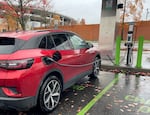Environmental and climate advocates are looking to revamp the state’s popular electric vehicle rebate program by lowering the rebate amount and allowing only qualified low-income residents to participate. But some say these changes could impact overall EV sales throughout the state.

FILE - An electric vehicle is charging at Oregon Museum of Science and Industry's parking lot on Nov. 11, 2024.
Monica Samayoa / OPB
House Bill 3597 aims to overhaul the Oregon Department of Environmental Quality’s Oregon Clean Vehicle Rebate Program.
Currently, the program offers two rebates —
- The Standard Rebate offers up to $2,500 back to anyone who purchases a new battery electric vehicle or plug-in hybrid under $50,000.
- The Charge Ahead Rebate applies to households making from $51,000 to $251,000, depending on the number of people living together. Those households may receive up to $5,000 back after purchasing or leasing a new or used battery electric or plug-in hybrid vehicle.
Residents who qualify for the Charge Ahead Rebate can also apply for the Standard Rebate and potentially receive a combined $7,500 back.
The EV rebate program receives at least $12 million a year from the state’s vehicle privilege tax.
Environmental and climate groups propose changing the rebate program to solely focus on residents who qualify through the Charge Ahead Rebate.
“We think that it’s just prudent to try to prioritize those dollars towards income-qualified programs and we’re also committed to talking and engaging with all the stakeholders to find the solutions that work for them,” Brett Morgan, transportation policy director with advocacy group Climate Solutions, said. “Including examining what income levels qualify. Again, we want to maximize the total number of electric vehicles on our road.”
Morgan said HB 3597 would sunset the Standard Rebate, which is offered to anyone, which then would free up more money toward the Charge Ahead Rebate. But the bill would also reduce Charge Ahead rebates for purchasing or leasing used vehicles by $2,000. The rebate for new vehicles would not change.
The bill would also direct more funding toward outreach and education in communities with lower average incomes so more people are aware of the program.
“At the end of the day, we just want to raise a conversation about what is the highest and best use of our current programs, and how can we make sure that our policies are being responsive and responsible given a really tough budget environment,” Morgan said.
Oregon’s Clean Vehicle Rebate program has rapidly grown in popularity since its inception in late 2018. It was signed into law in 2017, after the passage of House Bill 2017, which set the goal to increase battery electric and plug-in hybrid vehicle sales and reduce greenhouse gas emissions. The transportation sector accounts for 35% of the state’s greenhouse gas emissions, according to DEQ.
As of April 2, the program has issued $99.6 million in Standard and Charge Ahead rebates. The Department of Environmental Quality has issued about $66 million in Standard Rebates, about $9.4 million in Charge Ahead Rebates and about $24 million in combined rebates to qualified Oregonians.
As of December 2024, there are nearly 110,000 zero-emissions vehicles registered in the state, according to the Oregon Department of Energy dashboard. About 77,000 are battery electric vehicles and about 32,000 are plug-in hybrid electric vehicles.
Through the Biden administration’s Inflation Reduction Act, which allocated hundreds of billions of dollars toward climate action programs including rebates toward EVs, qualified Oregonians could have stacked state and federal rebates to receive up to $15,000 back.
But the state EV rebate program’s popularity has caused it to run out of funding for the past two years, and this year the program has yet to start.
Morgan said because the program continues to run out of funds, it needs to be open year-round. HB 3597 would allocate funding throughout the year rather than in one lump sum, to spread out available funding.
“That funding lapsing and people ending up on a waitlist, that is not helpful for Oregonians who might need to buy a car right then and there,” he said. “They can’t wait to purchase their next vehicle based on the timing of when the rebate might be open.”
Federal funds have been awarded to the state rebate programs, but some Republicans in Washington, D.C., want to end that federal support. Morgan said because there is so much uncertainty around federal allocations for environmental programs, it’s important the state finds its own dedicated annual funding.
Oregon Auto Dealers Association Executive Vice President Greg Remensperger agrees. During a public hearing for House Bill 3597, Remensperger said EV sales drop when the rebate program is not available.
But Remensperger said there are “problematic” issues in the bill that have led him to oppose it. That’s a different tune from his previous stances on EV incentives. Remensperger said eliminating the Standard Rebate, for buyers at all income levels, would have serious ramifications.
“That would seriously impact new EV sales,” he said. “I truly feel that the Charge Ahead Rebate is an important part of the program, but not at the cost of the Standard Rebate.”
Remensperger said lawmakers must recall the original intent when creating the program, which was to increase overall sales of EVs across the state.
The bill is currently headed to the Joint Committee on Transportation. If the bill is passed and signed into law, the new rebate framework could start in 2027.



